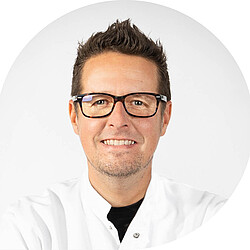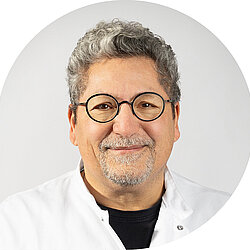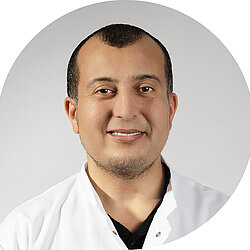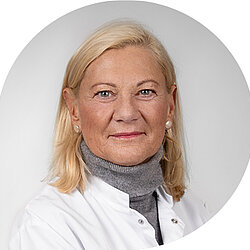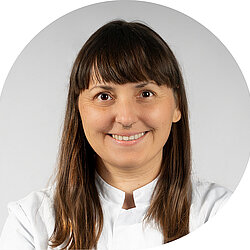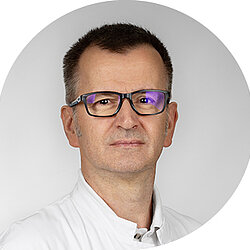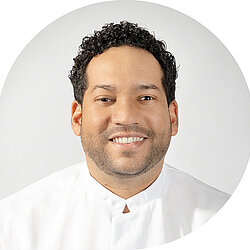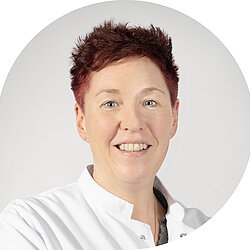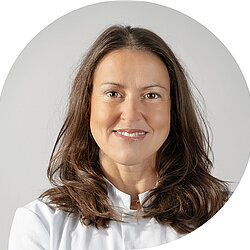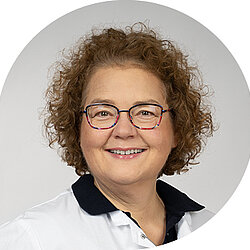You are in good hands with us
When you board an airplane, you trust that you will arrive safely at your destination. In the same way, you can rely on our team to ensure your safety with the utmost care and trustworthy, gentle treatment from the moment the anaesthetic begins. Before, during and after the operation, our doctors and nursing staff will accompany you individually and attentively so that you feel that you are in good hands at all times.
We will take the time to talk to you in detail during your pre-admission. We will inform you about the anesthesia, answer your questions and determine the appropriate anesthesia procedure together. A supplementary blood test will ensure that you are optimally prepared for the operation and that the procedure can take place as planned.
After the operation, we will look after you in the recovery room until you have recovered and can return to your room. We will also accompany you beyond this in close consultation with the surgeons.
The anesthetic procedure
To ensure that you do not feel any pain during the planned procedure, you can be given anesthesia (general anesthesia, in which the anesthetist eliminates consciousness and pain sensation throughout the body) or a targeted anesthesia of the affected area of the body (regional anesthesia). Both methods can also be combined. The doctor will discuss with you which anesthetic procedure is most suitable for you. Before anesthesia is administered, an indwelling cannula is placed in a vein (e.g. the vein in the hand or arm), through which the patient receives infusion solutions and, if necessary, medication such as anesthetics, painkillers or antibiotics.
The anesthetic
To induce anesthesia, the doctor injects a fast-acting anesthetic via the indwelling cannula. He then administers further anaesthetics or painkillers (intravenous anaesthesia) or administers anaesthetic gases to the patient by breathing (inhalation anaesthesia). Both methods are often combined.
A breathing mask is placed over the mouth and nose so that the patient can breathe well or be ventilated with oxygen. If necessary, anesthetic gas can also be administered via the mask. Alternatively, if the patient is already asleep, the anesthetist can insert a breathing tube through the mouth or nose into the windpipe. The patient is given a muscle relaxant beforehand in order to insert the tube gently.
Another option is a laryngeal mask. The breathing tube with an inflatable bead at the tip is pushed through the mouth to the opening of the larynx. Side effects such as hoarseness, difficulty swallowing or tooth damage are less common with this procedure.
Regional anesthesia
During regional anesthesia, the doctor injects a local anesthetic near pain-conducting nerves. This prevents the transmission of pain stimuli from the surgical site to the brain. The sensation of pain is usually switched off for several hours.
The anesthetic is noticeable through a tingling sensation and a feeling of warmth. The affected areas of the body become heavy and numb. As long as the effect lasts, the patient can only move the anesthetized parts of the body a little or not at all.
With regional anesthesia, the patient is awake, but can be given a sedative if necessary. This is also known as sedation. Separate information is provided on this. After sedation, the patient may have limited or no memory of the operation.
In some cases, it is advisable to use regional anesthesia in addition to anesthesia. The patient then requires less anesthetic, recovers more quickly after the procedure and experiences less pain after the operation, meaning that movement exercises can be started early on.
What to consider before anesthesia
Unless the doctor has instructed otherwise, you may eat and drink as usual until midnight on the day before the operation. After that, you are not allowed to eat anything.
On the morning of the operation, you can and should drink something until 6.00 a.m., for example one or two glasses or cups of clear liquid without solids, such as water or tea. Milk and alcohol are generally excluded. You must not drink anything from two hours before the anesthetic. If the instructions have not been followed, the doctor must be informed.
The doctor will discuss with you in advance of the operation which medication you may take or should discontinue or replace around the time of the operation. Contact lenses, removable dentures, rings and other jewelry as well as piercings must be removed beforehand. Face cream and cosmetics should also be avoided.
After anesthesia
Immediately after the operation, we will look after you in the recovery room for some time until your most important bodily functions are stable again. Due to the risk of falling, you must not stand up on your own at first. Please protect any parts of your body that are still anaesthetized from pressure damage and injury. Please only take medication according to your doctor's instructions or after consultation. The effect may be impaired - as is the case with the contraceptive pill, for example.
Please contact a doctor immediately if you experience any symptoms such as breathing or circulatory problems, loss of consciousness, pain, fever, chills, nausea, vomiting, sore throat or inflammation, movement disorders or signs of paralysis.
After an outpatient procedure, your ability to react is temporarily impaired by anesthetics, painkillers and other medications. For this reason, you will usually have to be picked up by another person who will look after you for the first 24 hours. You should also not make any important decisions during this time.

Marina Kleimusch
Secretariat anesthesia
- Phone+49 2351 945-2241
- Fax +49 2351 945-2337
- sekretariat.anaesthesie@hellersen.de
